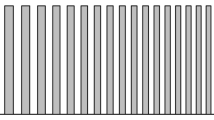Abstract
A proposal for an objective interpretation of probability is introduced and discussed: probabilities as deriving from ranges in suitably structured initial-state spaces. Roughly, the probability of an event on a chance trial is the proportion of initial states that lead to the event in question within the space of all possible initial states associated with this type of experiment, provided that the proportion is approximately the same in any not too small subregion of the space. This I would like to call the “natural-range conception” of probability. Providing a substantial alternative to frequency or propensity accounts of probability in a deterministic setting, it is closely related to the so-called “method of arbitrary functions”. It is explicated, confronted with certain problems, and some ideas how these might be overcome are sketched and discussed.
Similar content being viewed by others
References
Abrams, M. (2010). Mechanistic probability. Synthese. published online October 2010 (forthcoming).
Arntzenius F., Hall N. (2003) On what we know about chance. The British Journal for the Philosophy of Science 54: 171–179
Eagle A. (2004) Twenty-one arguments against propensity analyses of probability. Erkenntnis 60: 371–416
Engel E. (1992) A road to randomness in physical systems. Springer, Berlin
Frigg R., Hoefer C. (2010) Determinism and chance from a humean perspective. In: Stadler F. (ed.) The present situation in the philosophy of science. Springer, Dordrecht, pp 351–372
Glynn L. (2010) Deterministic chance. The British Journal for the Philosophy of Science 61: 51–80
Hájek A. (1997) Mises Redux’—Redux: Fifteen arguments against finite frequentism. Erkenntnis 45: 209–227
Hájek A. (2007) The reference class problem is your problem too. Synthese 156: 563–585
Hájek A. (2009) Fifteen arguments against hypothetical frequentism. Erkenntnis 70: 211–235
Hall N. (1994) Correcting the guide to objective chance. Mind 103: 505–517
Hoefer C. (2007) The third way on objective probability: A sceptic’s guide to objective chance. Mind 116: 549–596
Hopf E. (1934) On causality, statistics and probability. Journal of Mathematics and Physics 13: 51–102
Hopf, E. (1936). Über die Bedeutung der willkürlichen Funktionen für die Wahrscheinlichkeitstheorie. Jahresbericht der Deutschen Mathematikervereinigung 46: 179–195
Kneale W. (1949) Probability and induction. Clarendon Press, Oxford
Lewis D. (1980) A subjectivist’s guide to objective chance. In: Jeffrey R. (ed.) Studies in inductive logic and probability, Vol. II. University of California Press, Berkeley, pp 263–293
Lewis D. (1986) Postscripts to ‘A Subjectivist’s guide to objective chance. In: Lewis D. (ed.) Philosophical papers, Vol. II. Oxford University Press, New York, pp 114–132
Lewis D. (1994) Humean supervenience debugged. Mind 103: 473–490
Loewer B. (2001) Determinism and chance. Studies in History and Philosophy of Modern Physics 32: 609–620
Loewer B. (2004) David Lewis’s humean theory of objective chance. Philosophy of Science 71: 1115–1125
Mellor H. (1971) The matter of chance. Cambridge University Press, Cambridge
Mellor H. (1995) The facts of causation. Routledge, London
Myrvold W. (2011) Deterministic laws and epistemic chances. In: Menahem Y. B., Hemmo M. (eds.) Probability in physics. Springer, New York
North J. (2010) An empirical approach to symmetry and probability. Studies in History and Philosophy of Modern Physics 41: 27–40
Poincaré H. (1896) Calcul des Probabilités. Gauthier-Villars, Paris
Popper K. (1959) The propensity interpretation of probability. The British Journal for the Philosophy of Science 10: 25–42
Popper K. (1990) A world of propensities. Thoemmes, Bristol
Reichenbach H. (1935) Wahrscheinlichkeitslehre. Sijthoff, Leiden
Rosenthal J. (2004) Wahrscheinlichkeiten als Tendenzen. Eine Untersuchung objektiver Wahrscheinlich- keitsbegriffe. Mentis, Paderborn
Rosenthal J. (2010) The natural-range conception of probability. In: Ernst G., Hüttemann A. (eds.) Time, chance and reduction. philosophical aspects of statistical mechanics. Cambridge University Press, Cambridge, pp 71–91
Schaffer J. (2007) Deterministic chance?. The British Journal for the Philosophy of Science 58: 113–140
Strevens M. (2003) Bigger than chaos. Harvard University Press, Cambridge (Mass.)
Strevens M. (2008) Depth. An account of scientific explanation. Harvard University Press, Cambridge (Mass.)
Strevens M. (2011) Probability out of determinism. In: Beisbart C., Hartmann S. (eds.) Probabilities in physics. Oxford University Press, Oxford
Suppes P. (2010) The nature of probability. Philosophical Studies 147: 89–102
Thau M. (1994) Undermining and admissibility. Mind 103: 491–503
von Kries J. (1886) Die Principien der Wahrscheinlichkeitsrechnung. Mohr Siebeck, Tübingen
von Mises, R. (1928). Wahrscheinlichkeit, Statistik und Wahrheit. Wien: Springer. 2nd revised English edition: Probability, Statistics and Truth, London: Allen & Unwin (1957).
von Plato J. (1982) Probability and determinism. Philosophy of Science 49: 51–66
von Plato J. (1983) The method of arbitrary functions. The British Journal for the Philosophy of Science 34: 37–47
von Plato J. (1994) Creating modern probability. Cambridge University Press, Cambridge
von Smoluchowski, M. (1918). Über den Begriff des Zufalls und den Ursprung der Wahrscheinlichkeitsgesetze in der Physik. Die Naturwissenschaften, 6: 253–263
Author information
Authors and Affiliations
Corresponding author
Rights and permissions
About this article
Cite this article
Rosenthal, J. Probabilities as Ratios of Ranges in Initial-State Spaces. J of Log Lang and Inf 21, 217–236 (2012). https://doi.org/10.1007/s10849-011-9153-x
Published:
Issue Date:
DOI: https://doi.org/10.1007/s10849-011-9153-x



